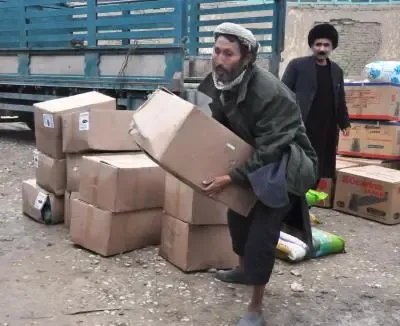Could Funding Shortages Disrupt Humanitarian Aid in Afghanistan?

Synopsis
Key Takeaways
- OCHA warns of funding cuts threatening humanitarian aid.
- 90% of Afghan families face severe food shortages.
- Immediate funding is crucial to prevent humanitarian disaster.
- Restrictions on women's work limit access to essential services.
- Returning refugees strain recovery efforts.
Kabul, Nov 16 (NationPress) The United Nations Office for the Coordination of Humanitarian Affairs (OCHA) alerted on Sunday that a lack of funding could put a stop to humanitarian efforts in Afghanistan from October to December, according to local news sources.
OCHA indicated that this potential interruption could adversely affect life-saving assistance, including food supplies, clean water, educational support, and basic health services that millions of Afghan citizens depend on, as reported by the leading news agency Khaama Press.
The agency stressed that prompt funding is crucial for maintaining humanitarian operations, highlighting that even brief interruptions could lead to serious humanitarian consequences as winter approaches.
UN agencies and global relief organizations have continually warned that Afghanistan's aid lifeline is under immense pressure due to dwindling donations from the international community coupled with the escalating needs of the population.
Humanitarian analysts have cautioned that the crisis could worsen if the international community fails to make financial pledges, leaving vulnerable families without essential support amidst growing food insecurity.
International organizations have called upon donors to provide financial resources, emphasizing that Afghanistan's aid response is vital to avert a larger humanitarian crisis in the upcoming months.
Meanwhile, the United Nations has warned that 90 percent of families in Afghanistan are experiencing severe food shortages.
The United Nations Development Programme (UNDP) reported that nine out of ten families in Afghanistan have had to cut back on food consumption or sell possessions to survive, a situation worsened by the influx of Afghan refugees returning from Iran and Pakistan, according to Khaama Press.
UNDP Regional Director for Asia and the Pacific, Kanni Wignaraja, highlighted that restrictions on women working in humanitarian and reconstruction efforts have hindered access to essential services.
The report released on November 13 is based on a survey of nearly 49,000 Afghan families, which includes over 1,500 refugee families.
The return of approximately 2.3 million refugees is further straining recovery efforts in Afghanistan.









